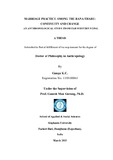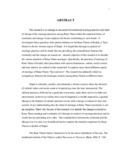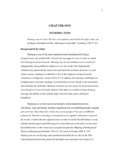Please use this identifier to cite or link to this item:
http://archive.nnl.gov.np:8080/handle/123456789/199| Title: | MARRIAGE PRACTICE AMONG THE RANA THARU: CONTINUITY AND CHANGE AN ANTHROPOLOGICAL STUDY FROM FAR WESTERN NEPAL |
| Authors: | Ganga K.C., Ganga |
| Keywords: | ANTHROPOLOGICAL STUDY |
| Issue Date: | 28-Mar-2019 |
| Abstract: | This research is an attempt to document the overall status of Rana Tharu marriage practices and to highlight their traditional marriage practices and factors relating them. It explores those questions with special reference to the Rana Tharus of Kailali, a Tarai district in the far western region of Nepal. The Rana Tharus believe themselves to be the native inhabitants of the area. The traditional territory of the Tharu is called Tharuwan or Tharuwot (Bista, 1996; P. 130). There are different Tharu groups with different names throughout the Tarai region of the country from Far East to far west. They are Rana, Khuna, Kathariya and Dangaura, Kochila, Lalpuriya, Lampuchhuwa, Lorangiya and Sunaha. Each of the Tharu groups is more or less confined to a specific area. For instance the Kochila live in Mahottari, Saptari Morang and Jhapa districts. Rajhatiya, Solariya, Dangoura and Khas live in Dang Deukhuri. Mardaniya, Chitauniya and Suncha live in Chitwan district and Rana Tharu live only in Kailali and Kanchanpur districts close to Indian border. Rana Tharu is distinct Tharu group among the different Tharu groups who have their own indigenous traditions. They are totally different from other Tharu groups with their distinctive and significant cultural and social practices. Nepal is culturally, racially, and ethnically a diverse country where the diversity of cultural values and norms seem to be practicing since the time immemorial. The cultural practices, followed by a particular community, make them survive in their own environment, however no culture does exist if adaptation is strictly imposed as a gradual change in the features of cultural practices occurs with a change in relation to time and context. In my understanding also the ritual of marriage in Rana Tharu community is not an exception. That's why the aim of this research is to identify the changes occurred in Rana Tharu marriage and continuity of it through an analysis of marriage practices and its rituals that are prevailing now a day. The contradictions between the continuity and the change over it is also over looked and tried to analyze the situation experience by Rana Tharus in Kailali of Nepal. |
| URI: | http://103.69.125.248:8080/xmlui/handle/123456789/199 |
| Appears in Collections: | 300 Social sciences |
Files in This Item:
| File | Description | Size | Format | |
|---|---|---|---|---|
| 1 ThesisCover1.pdf | 161.7 kB | Adobe PDF |  View/Open | |
| Abstract.pdf | 114.29 kB | Adobe PDF |  View/Open | |
| Maintext.pdf | 1.77 MB | Adobe PDF |  View/Open |
Items in DSpace are protected by copyright, with all rights reserved, unless otherwise indicated.